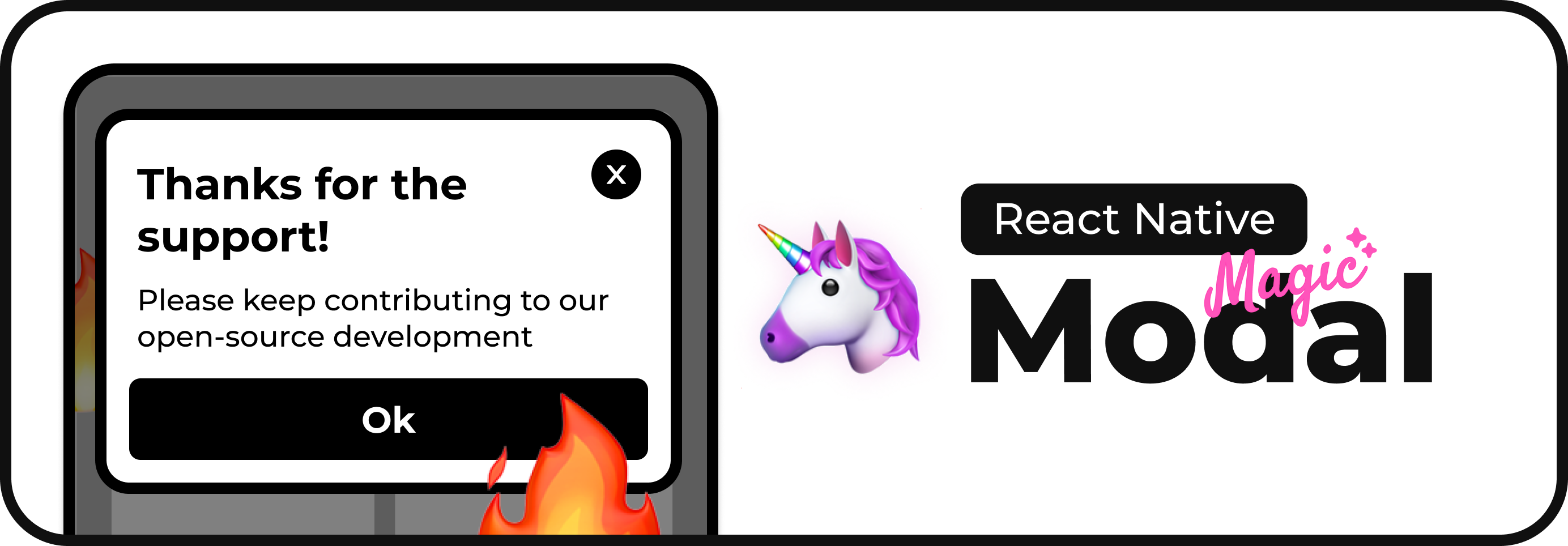react-native-magic-modal
React Native Magic Modal 🦄

Simplify your modal management in React Native with the React Native Magic Modal library. Effortlessly control modals, streamline complex flows, and create a seamless user experience.
Our new version just got released with full support for multiple modals! See the breaking changes.
Features
- 📲 Easy Integration: Seamlessly integrate with your React Native app.
- 🔄 Complex Flow Management: Manage intricate modal sequences effortlessly.
- 🔧 Customizable: Tailor modals to fit your app's unique requirements.
Highlights
React Native Magic Modal offers a superior experience compared to traditional modal implementations:
- 🎨 Stylish and Responsive: Designed to look great on both iOS and Android.
- 🚀 Developer Friendly: Simple to use, with a focus on developer experience.
- 🧩 Versatile: Adaptable to a wide range of modal scenarios.
Table of Contents
Installation
Add peer dependencies to your project, if you haven't already:
yarn add react-native-reanimated
yarn add react-native-gesture-handler
Install the package:
yarn add react-native-magic-modal
Quickstart
Insert a MagicModalPortal at the top of your application structure, and a GestureHandlerRootView if you haven't already:
import { MagicModalPortal } from "react-native-magic-modal";
import { GestureHandlerRootView } from "react-native-gesture-handler";
export default function App() {
return (
<GestureHandlerRootView>
<YourAppContent />
<MagicModalPortal /> {/** After your app component hierarchy */}
</GestureHandlerRootView>
);
}
Tip: the root _layout.tsx is usually the best place to put it in a project using expo-router.
Examples
Showcasing modal management on iOS and Android platforms:
| iOS | Android |
|---|---|
Usage
Here's the preferred usage pattern for the library:
import React from "react";
import { View, Text, TouchableOpacity } from "react-native";
import {
MagicModalPortal,
magicModal,
useMagicModal,
MagicModalHideReason
} from "react-native-magic-modal";
import { GestureHandlerRootView } from "react-native-gesture-handler";
type ConfirmationModalReturn = {
success: boolean;
};
const ConfirmationModal = () => {
const { hide } = useMagicModal<ConfirmationModalReturn>();
return (
<View>
<TouchableOpacity onPress={() => hide({ success: true })}>
<Text>Click here to confirm</Text>
</TouchableOpacity>
</View>
);
};
const ResponseModal = ({ text }) => {
const { hide } = useMagicModal();
return (
<View>
<Text>{text}</Text>
<TouchableOpacity onPress={() => hide()}>
<Text>Close</Text>
</TouchableOpacity>
</View>
);
};
const handleConfirmationFlow = async () => {
// You can call `show` with or without props, depending on the requirements of the modal.
const result = await magicModal.show<ConfirmationModalReturn>(() => <ConfirmationModal />).promise;
// Hide could potentially be a backdrop press, a back button press, or a swipe gesture.
if (result.reason !== MagicModalHideReason.INTENTIONAL_HIDE) {
// User cancelled the flow
return;
}
if (result.data.success) {
return magicModal.show(() => <ResponseModal text="Success!" />).promise;
}
return magicModal.show(() => <ResponseModal text="Failure :(" />).promise;
};
export const MainScreen = () => {
return (
<GestureHandlerRootView>
<TouchableOpacity onPress={handleConfirmationFlow}>
<Text>Start the modal flow!</Text>
</TouchableOpacity>
<MagicModalPortal />
</GestureHandlerRootView>
);
};
You can also hide modals imperatively outside of the modal context. For that, we provide the global hide method, that requires a modal id:
import { magicModal } from "react-native-magic-modal";
const QuickModal = ({ text }) => {
return (
<View>
<Text>Hey! I'm going to be closed imperatively</Text>
</View>
);
};
const handleQuickModal = async () => {
const { modalId } = magicModal.show(QuickModal);
// Wait for 2 seconds before closing the modal
await new Promise((resolve) => setTimeout(resolve, 2000));
// Note that it's usually preferrable to use the `hide` method from the modal context
// You can even put it inside useEffects to handle auto-dismissal for you.
magicModal.hide({ modalId });
};
export const MainScreen = () => {
return (
<GestureHandlerRootView>
<TouchableOpacity onPress={handleQuickModal}>
<Text>Show a quick modal</Text>
</TouchableOpacity>
<MagicModalPortal />
</GestureHandlerRootView>
);
};
Refer to the kitchen-sink example for detailed usage scenarios.
Documentation
Access the complete documentation here.
FAQ
Q: Can I have two modals showing up at the same time?
A: Yes. With v4+, you can now have multiple modals showing up at the same time.
Q: Can I use Scrollables inside the modal?
A:
Yes, but Scrollables can't be used with swipe gestures enabled, as they conflict. Pass in swipeDirection: undefined on the magicModal.show function to disable gestures on them.
If your use-case is a scrollable bottom-sheet, I recommend going with Gorhom's react-native-bottom-sheet for this use-case temporarily.
Q: Modals are appearing on top of native modal screens, such as the image picker. How can I fix this?
A:
This behavior can be disabled by calling magicModal.disableFullWindowOverlay() before showing the modal. This will prevent the modal from appearing on top of native modal screens.
You can also call magicModal.enableFullWindowOverlay() to re-enable it.
Contributors
Special thanks to everyone who contributed to making React Native Magic Modal a robust and user-friendly library. See the full list.
See the contributing guide to learn how to contribute to the repository.
License
React Native Magic Modal is licensed under the MIT License.


